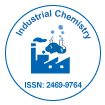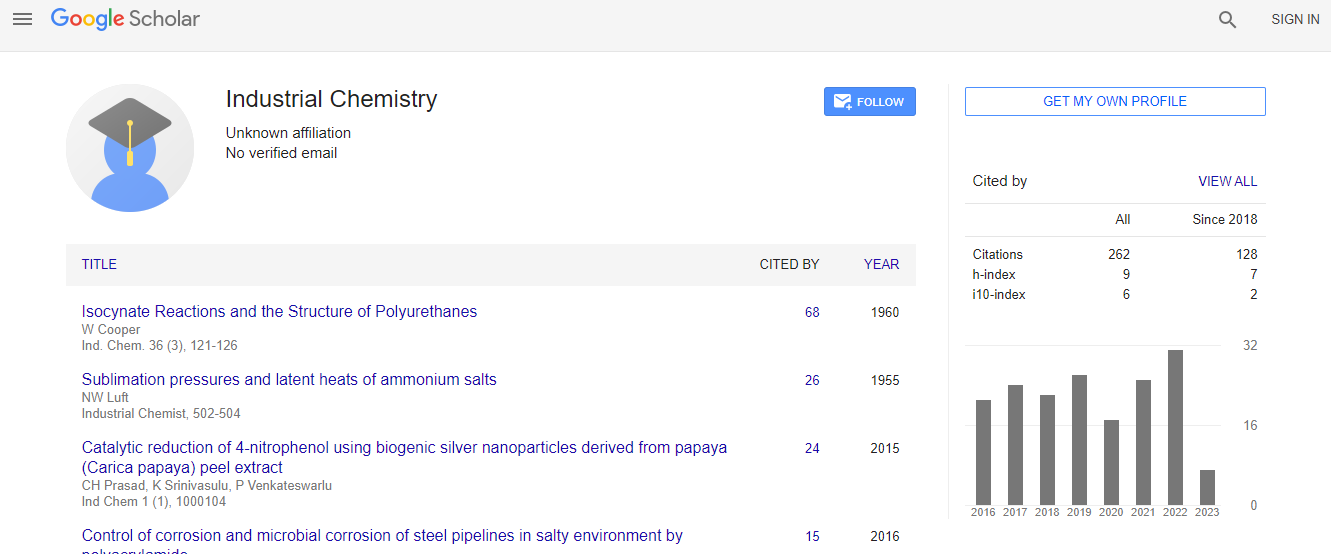Our Group organises 3000+ Global Conferenceseries Events every year across USA, Europe & Asia with support from 1000 more scientific Societies and Publishes 700+ Open Access Journals which contains over 50000 eminent personalities, reputed scientists as editorial board members.
Open Access Journals gaining more Readers and Citations
700 Journals and 15,000,000 Readers Each Journal is getting 25,000+ Readers
Google Scholar citation report
Citations : 262
Industrial Chemistry received 262 citations as per Google Scholar report
Indexed In
- Index Copernicus
- Google Scholar
- RefSeek
- Directory of Research Journal Indexing (DRJI)
- Hamdard University
- EBSCO A-Z
- OCLC- WorldCat
- Scholarsteer
- Geneva Foundation for Medical Education and Research
- Euro Pub
Useful Links
Recommended Journals
Related Subjects
Share This Page
Discovery and development of synthetic tricyclic pyrroloquinone alkaloid analogs for human cancer therapy
International Conference on Industrial Chemistry
Sadanandan E Velu
University of Alabama at Birmingham, USA
ScientificTracks Abstracts: Ind Chem
Abstract
Marine natural products have established themselves as an important source of novel chemical entities that are unlikely to be found in the terrestrial environment. For the past half century, global marine sources have proven to be a rich source of a vast array of new medicinally valuable compounds. In the recent past, there has been an increase in the number of anticancer alkaloids isolated from marine sources, with sponges being an abundant source of chemically and biologically diverse natural products. This is largely due to the improvements in the deep-sea sample collection technology.In this talk, I will present a story of the discovery, synthesis and evaluation of three marine derived tricyclic pyrroloquinone (TPQ) alkaloid analogs ascancer therapeutic agents. Chemical synthesis of these compounds (BA-TPQ, TBA-TPQ, and TCBA-TPQ) has been accomplished and the mechanisms of action (MOA) and structure-activity relationships (SAR) have been investigated. In the past, the complexity of chemical synthesis and the lack of well-defined mechanism of action have dampened the enthusiasm for the development of this class of marine alkaloids. Recent discovery of novel molecular targets for these alkaloids warrant further consideration of these compounds as pre-clinical candidates. We have successfully demonstrated that these compoundsattackseveralkey molecular targets, including the MDM2-p53 pathway. In addition to the establishment of synthetic methods and mechanism of action, in vitro and in vivo anticancer activities of these compounds are also demonstrated.Biography
Sadanandan E Velu has received his PhD in Organic Chemistry at the University of Madras in 1993. He did his Postdoctoral research at the University of Alabama and at Clemson University. Currently, he is working as a Tenured Associate Professor in the University of Alabama at Birmingham. He also holds co-appointments as an Associate Scientist in Comprehensive Cancer Center and Center for Clinical and Translational Sciences of the University of Alabama at Birmingham. He has authored 63 research articles and is an inventor/co-inventor of US 5 patents. He is a member of American Chemical Society, American Association of Cancer Research and American Heart Association.
Email: svelu@uab.edu

 Spanish
Spanish  Chinese
Chinese  Russian
Russian  German
German  French
French  Japanese
Japanese  Portuguese
Portuguese  Hindi
Hindi 